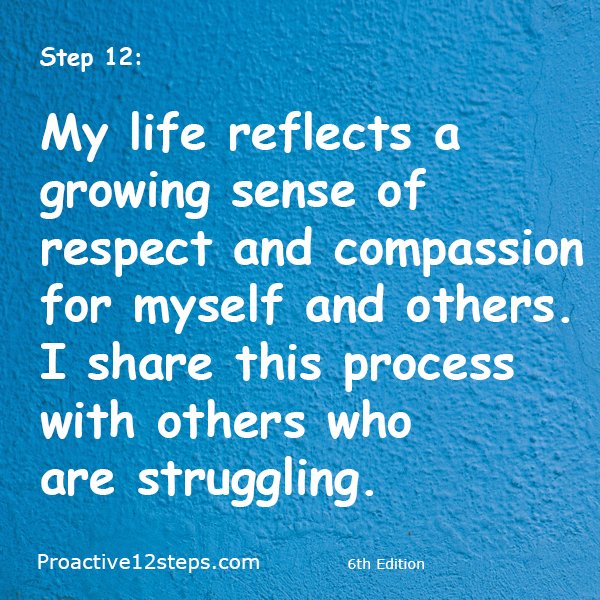
My life reflects a growing sense of respect and compassion for myself and others. I share this process with others who are struggling.
Discussion of Step 12:
What does it mean to have compassion for yourself? Essentially, this is what you’ve been doing throughout these steps, instead of harshly judging yourself.
What you have learned
Instead of forcing yourself to do something against the sense of fear or hurt you experience, you have been trying to understand what made you do what you did. You have learned that sustainable changes are changes that you are happy with, as opposed to changes that you force on yourself through some abstract idea of what you should be doing.
Throughout this process, you have learned to be aware of, respect, and understand different parts of yourself that may conflict. You have been finding ways to get unstuck based on a better understanding of the forces in conflict.
As you stay with this process, you realize that it is not just you; it is human nature. So that adventure, that journey you had in understanding yourself better, is not just about understanding the specifics of the situation. It is also about understanding the way it affects all of us human beings. You now see your experiences as part of the human condition. Your struggle is simply the form that it takes for you. Every human being experiences some form of suffering or another.
Kinship with others
Through your experience of suffering, you may be drawn especially to those people whose kind of struggle is closest to yours. For instance, it makes sense for alcoholics to gather together; this fosters a sense of kinship. They feel they understand each other better because they’ve been going through some very similar challenges, which unites them. The same thing goes for other Twelve Steps programs for various forms of addiction.
The Proactive 12 Steps are not just for people who are dealing with addiction. They are for all human beings dealing with the pressures, fears, and difficulties of the human condition. In theory, you could connect with any other human being based on joint suffering from the human condition. In practice, it is easier to get close to people who are more like you.
As you go through this program with kindred spirits, you get to see that the kind of suffering you have does not set you apart from the rest of humanity. It is the specific way in which you are experiencing the human condition. And so your heart opens up to better understanding other people in the world, as you feel a kinship with them.
Feeling a kinship with others does not necessarily mean that you understand the specifics of what happens to them. It might be dangerous to think that you fully understand anybody. If you felt that way, you might get more closed instead of wanting to hear about their experiences because you’d feel like you already know. It is dangerous to assume that you automatically understand how other people function.
Through your suffering, you come to appreciate the value of becoming closer to people by being compassionate with their plight. And you become more aware of the possibility of finding some common ground if you dig deep enough.
A deeper understanding
Through these steps, you come to understand your experience in a very different way from the way you did when you started. You’re freer from polarized thinking that sees the world in terms of good and evil. You have a more complex, more nuanced understanding of the fears and pressure that led you to adopt coping behaviors. You have become more comfortable staying with the excruciating difficulty of feeling vulnerable. And you also know that you have not entirely resolved these things. You are far from perfect, and that’s okay.
The more you know about yourself, the more you are aware of how much is still unknown. You know that you have gained some degree of comfort in some situations but still feel stress in others. You have reached a superhuman level of understanding that makes you impervious to all the challenges, fears, and pressures of life. On the contrary, you know how vulnerable you are. You know a lot about your limitations, but you can live with that or certainly can live with it more than you used to. You don’t have to be perfect to be okay.
And so it is that a greater understanding of your vulnerabilities makes it possible to connect more with other people. This kind of connection is very different from what preaching would be.
Preaching involves a sense that you are in contact with a transcendent truth that you want to force-feed others. You are sure that, if only people listened to you, their life would be better.
A gentler attitude
The kind of truth that you have come into touch with is much softer. These are not absolute truths about: “Do this!” or “If you believe this, your life will be better!” Your insights are very nuanced. They are more about the inevitability of vulnerability and the fleeting quality of moment-by-moment experience. They are also about the possibility of finding a sense of having more space, of expanding, having more satisfaction in life, and staying with that.
These are not things that you were able to get by forcing yourself. You got to that by progressively expanding your comfort zone by dealing with vulnerability. This attitude is what you want to bring in connecting with others.
Conversely, you are not doing this outreach just out of the goodness of your heart. It is not that you are such a fantastic person, helping others who are in dire need of your words of wisdom to get better. You are seeking connection because you have experienced how connecting with others who are willing to face their vulnerabilities helps you. Now, you know that being helpful to others helps you as well.